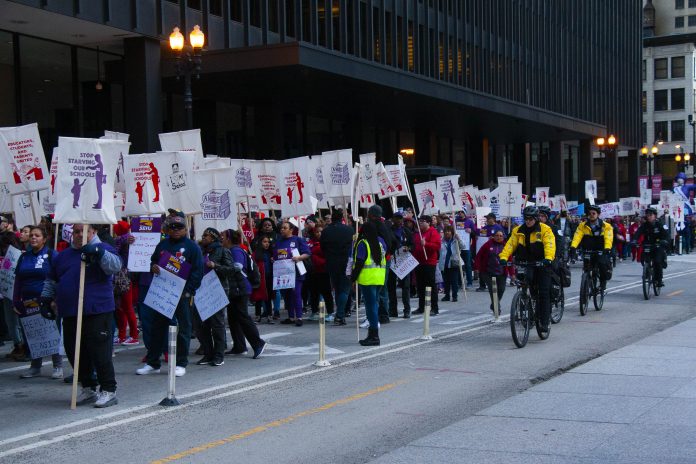Government unions routinely make use of taxpayer-funded payroll systems in Pennsylvania to siphon off funds for political activism, but this practice came one step closer to ending when the commonwealth’s House Labor and Industry Committee passed a “paycheck protection” bill on January 25.
H.B. 2048, sponsored by Rep. Ryan Mackenzie (R-Lehigh), would prohibit government agencies, including school districts, from deducting political action committee (PAC) contributions from public employees’ wages. The proposed law, is now eligible for a full vote in the Pennsylvania House.
Campaign finance records show that from 2007-2020 Pennsylvania government unions spent $152 million on politics, including $67 million in PAC spending.
The policy change is needed so that public resources cannot be used to advance political agendas that rank-and-file union members and other taxpayers do not necessarily share, says Mackenzie.
“The amount of money collected in this way for purely political purposes is staggering,” Mackenzie said. “I have heard from union members who have concerns that union donations to political candidates are sometimes in conflict with their own political positions. In a growing number of cases, this concern is creating friction between union leaders and the members they are supposed to be representing.”
The teachers’ unions ring the bell where political spending is concerned. The Pennsylvania State Education Association, an affiliate of the National Education Association, and the state’s largest public employee union with roughly 178,000 members, is out in front with its Political Action Committee for Education spending more than $19 million since 2007.
An analysis of U.S. Department of Labor records by Americans for Fair Treatment, a nonprofit that advocates for free speech rights on behalf of public employees, shows that for the 2019-2020 school year, the PSEA spent about $3.9 million of its members’ dues on political activities and lobbying, with just 21 percent of its spending going toward “representational activities” for members.
The Service Employees International Union Committee on Political Education comes in second, spending more than $12 million in PAC money since 2007 on Pennsylvania politics. The other major player is the American Federation of State, County and Municipal Employees, which contributed more than $1.3 million in the 2021 cycle through AFSCME People and AFSCME District Council 13.
“Not many people realize—and most are horrified when they learn—that taxpayer resources are used to collect political campaign contributions on behalf of government unions,” said Nathan Benefield, vice president of the Commonwealth Foundation, a free market think tank in Harrisburg. “State government and local school districts collect millions of dollars in union dues and even PAC contributions that they then send to government union leaders—who turn around and use the money to elect the same government officials they negotiate with. This nefarious practice needs to end. Public resources should never be used for politics.”
Mackenzie’s bill was one of four labor reform measures passed out of the House committee on January 25. Another bill would bring Pennsylvania law into compliance with the U.S. Supreme Court ruling in Janus v. AFSCME that struck down so-called “fair share fees” for union representation of nonunion public employees. The high court ruled in June 2018 that under the First Amendment nonunion members cannot be forced to pay union fees.
The two other pieces of legislation address employee privacy and the need for greater transparency in the collective bargaining process. One bill protects public workers’ Social Security numbers, home addresses, home and personal telephone numbers, and personal email addresses from being shared in the collective bargaining process. The other bill would require government officials to publicize any collective bargaining agreement 14 days in advance of enactment, including a cost estimate.
Only five states have full paycheck protection, according to a report from the Commonwealth Foundation, a free market think tank in Harrisburg. They are: Indiana, Iowa, Michigan, Oklahoma, and Wisconsin. The foundation defines full paycheck protection as “a complete prohibition of the payroll deduction of union dues and political contributions.”
Rep. Kate Klunk (R-Hanover), the sponsor of the bill that would eliminate Pennsylvania’s unconstitutional fair share fee law, expects to see momentum build for labor reform despite union opposition. Paycheck protection is a vital piece of the overall package, says Klunk.
“The government should not be in the business of moving money around for political purposes,” Klunk said. “The government should not serve as a middleman for these kinds of contributions.”
Kevin Mooney (kevin.mooneyj@gmail.com) is an investigative reporter with The Heritage Foundation and the Commonwealth Foundation.





















[…] post Paycheck Protection Bill Advances in Pennsylvania appeared first on Heartland Daily […]
[…] Read the full article here. […]